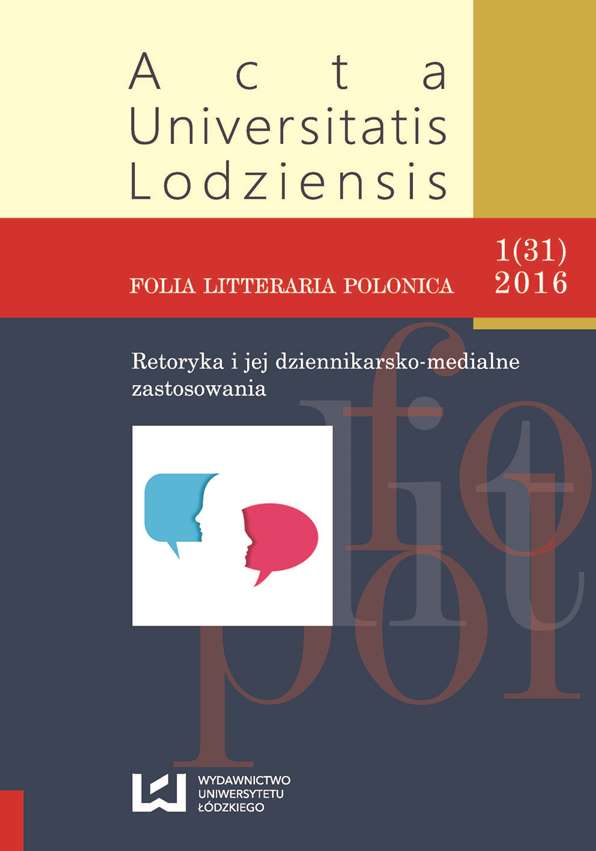Retoryczne aspekty popularyzacji naukowej
DOI:
https://doi.org/10.18778/1505-9057.31.05Słowa kluczowe:
scientific popularization, rhetoric, inventio, dispositio, elocutioAbstrakt
After having distinguished the two main contexts for the transmission of knowledge – the esoteric and exoteric – the paper offers a systematic comparison between scientific and popular science texts in terms of inventio, dispositio and elocutio. The popular science texts tend to present knowledge in anthropocentric terms, showing the relevance of the message to the recipients’ everyday lives. They turn out to be shorter than genuine scientific texts, and this is achieved, among others, by eliminating information about the methodologies used. The user-friendly vocabulary offers the audience a sense of familiarity with the presented topic, which is, however, different from in-depth specialist knowledge.
Pobrania
Bibliografia
Beaugrande R.-A.de, Dressler W.U., Wstęp do lingwistyki tekstu, przeł. A. Szwedek, PWN, Warszawa 1990.
Google Scholar
Coe R.M., „An arousing and fulfilment of desires”. The rhetoric of genre in the process era – and beyond, [in:] Genre and the new rhetoric, ed. A. Freedman, P. Medway, Taylor and Francis, London 1994, pp. 181–190.
Google Scholar
Donghi P., Sui generis. Temi e riflessioni sulla comunicazione della scienza, Gius, Laterza & Figli, Roma–Bari 2006.
Google Scholar
Gotti M., Specialized discourse: linguistic features and changing conventions, Peter Lang, Bern 2003.
Google Scholar
Konik T., Przypadki retorycznie istotnych zmian redakcyjnych w tłumaczeniach publicystyki prasowej o tematyce gospodarczej, [w:] Retoryka w komunikacji specjalistycznej, red. M. Załęska, Polskie Towarzystwo Retoryczne, Warszawa 2015, s. 187–216.
Google Scholar
Myers G., Discourse studies of scientific popularization: questioning the boundaries, “Discourse Studies” 2003, 5 (2), pp. 265–279.
Google Scholar
DOI: https://doi.org/10.1177/1461445603005002006
Piekot T., Mechanizmy popularyzowania wiedzy naukowej, [w:] O trudnym łatwo: materiały sesji poświęconej popularyzacji nauki, red. J. Miodek, M. Zaśko-Zielińska, Wydawnictwo UWr, Wrocław 2002, s. 95–110.
Google Scholar
Plantin Ch., Les bonnes raisons des émotions. Principes et méthode pour l’étude du discours émotionné, Peter Lang, Bern etc. 2008.
Google Scholar
Shapin S., Never Pure. Historical Studies of Science as if It Was Produced by People with Bodies, Situated in Time, Space, Culture, and Society, and Struggling for Credibility and Authority, The Johns Hopkins University Press, Baltimore 2010.
Google Scholar
Sierotowicz T., Od metodycznej polemiki do polemiki metodologicznej. Impresje z lektury „Wagi probierczej” Galileusza wraz z antologią, Wydawnictwo Diecezji Tarnowskiej Biblos, Tarnów 2008.
Google Scholar
Starzec A., Przemiany w popularyzacji prasowej, [w:] O trudnym łatwo: materiały sesji poświęconej popularyzacji nauki, red. J. Miodek, M. Zaśko-Zielińska, Wydawnictwo UWr, Wrocław 2002, s. 24–31.
Google Scholar
Swales J.M., Genre Analysis. English in Academic and Research Settings, Cambridge University Press, Cambridge 1993.
Google Scholar
Toulmin S., Rieke R.D., Janik A., An Introduction to Reasoning, Macmillan Publishing Company, New York–London 1984.
Google Scholar
Werlich E., Typologie der Texte. Entwurf eines textlinguistischen Modells zur Grundlegung einer Textgrammatik, Quelle & Meyer, Heidelberg 1975.
Google Scholar
Załęska M., La semplicità e la semplificazione: fra l’ideologia e la retorica, “Circula: Révue d’idéologies linguistiques” 2015, No 2, pp. 192–211, http://circula.recherche.usherbrooke.ca/2015-numero-2-fr/ [dostęp: 3.11.2015].
Google Scholar
DOI: https://doi.org/10.17118/11143/7990
Załęska M., Retorica della linguistica. Scienza, struttura, scrittura, Peter Lang, Frankfurt am Main etc. 2014.
Google Scholar
Załęska M., Retoryka a wiedza: komunikacja niespecjalistyczna i specjalistyczna, [w:] Retoryka w komunikacji specjalistycznej, red. M. Załęska, Polskie Towarzystwo Retoryczne, Warszawa 2015, s. 53–83.
Google Scholar
Zoolożka, z J. Bagniewską rozm. M. Borowska, „Gazeta Wyborcza” 2014, 28.06, dodatek „Wysokie Obcasy”, nr 25 (784), s. 8–13.
Google Scholar
Pobrania
Opublikowane
Jak cytować
Numer
Dział
Licencja

Utwór dostępny jest na licencji Creative Commons Uznanie autorstwa – Użycie niekomercyjne – Bez utworów zależnych 4.0 Międzynarodowe.











